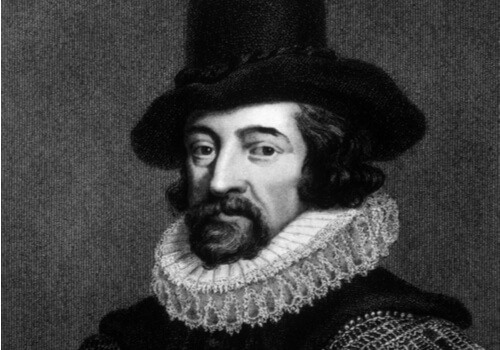Five Quotes by Francis Bacon About Knowledge


Reviewed and approved by the psychologist Sergio De Dios González
Knowledge is vital for the world to evolve and improve. Great thinkers, like the one to whom we dedicate this article, have always been well aware of this fact. So let’s take a look at some quotes on the subject of learning and knowledge by Francis Bacon.
Before we start, we’re going to get to know the protagonist of our article a little better. Indeed, let’s see who the English politician and philosopher Francis Bacon, considered the creator of the essay genre, really was.
Francis Bacon
Born into a wealthy family, his father was part of the high magistracy under the command of the government of Elizabeth I. However, more interestingly, his mother, Anne Cooke Bacon, was one of the most enlightened women in England of the time.
Francis Bacon was born and raised among intellectuals. He entered the prestigious Trinity College in Cambridge in 1573 to study science. In 1576, he traveled to France as ambassador Amyas Paulet’s attaché, beginning his political career at a really young age and gaining a great deal of experience.
After the death of his father in 1579, Bacon returned to England, where he finished his law studies. He began practicing law in 1582. Two years later, he entered the House of Commons where he had his own seat. At the dawn of the 17th century, he wrote The Advancement of Learning and amassed enough fortune to focus entirely on his career as a philosopher and scientist.

Francis Bacon quotes regarding knowledge and learning
Francis Bacon’s philosophy was extremely influential in his time and in times to come. He considered that people are interpreters and servants of nature and that knowledge is only acquired through experience. For this reason, he’s recognized as a great contributor of logic to the inductive experimental method.
The thought
“Who does not want to think is a fanatic; who cannot think is an idiot; who does not dare to think is a coward”.
Thought and knowledge have always been linked. In fact, one of the great maxims of education is learning critical thinking. In this quote by Francis Bacon, we observe how the thinker cataloged those people who, for various reasons, couldn’t or didn’t want to think.
Nature and rules
“We think according to nature. We speak according to rules. We act according to custom”.
As a good philosopher, Francis Bacon was a great connoisseur of human society. He concluded that the nature of each individual has great weight in their way of thinking. He also thought that social rules shape character, and that custom, routine, and tradition play an important role in the way that people conduct themselves.
Knowledge
“There is nothing makes a man suspect much, more than to know little, and therefore men should remedy suspicion by procuring to know more, and not keep their suspicions in smother”.
A person who wants to know more will be curious. These individuals are more restless and feel impelled to learn and be wiser, even though they’re aware of their limitations.
Educational subjects
“Histories make men wise; poets, witty: the mathematics, subtle; natural philosophy, deep; moral, grave; logic and rhetoric, able to contend”.
Francis Bacon was a strong advocate of knowledge. He believed that the more you know about a subject, the better person you are. Furthermore, he didn’t just mean with respect to one subject. As you can see from the quote, he believed that each subject endows a different quality on the learner.

Power
“Knowledge itself is power.”
This sentence couldn’t be clearer. Power always comes from knowledge. The more a human being knows, the more powerful they can become.
Now you’ve read these Francis Bacon quotes about knowledge, you can surely appreciate what a privileged and extremely talented mind he possessed. His advice was to listen to our past in order to better live our present while projecting into the future.
Knowledge is vital for the world to evolve and improve. Great thinkers, like the one to whom we dedicate this article, have always been well aware of this fact. So let’s take a look at some quotes on the subject of learning and knowledge by Francis Bacon.
Before we start, we’re going to get to know the protagonist of our article a little better. Indeed, let’s see who the English politician and philosopher Francis Bacon, considered the creator of the essay genre, really was.
Francis Bacon
Born into a wealthy family, his father was part of the high magistracy under the command of the government of Elizabeth I. However, more interestingly, his mother, Anne Cooke Bacon, was one of the most enlightened women in England of the time.
Francis Bacon was born and raised among intellectuals. He entered the prestigious Trinity College in Cambridge in 1573 to study science. In 1576, he traveled to France as ambassador Amyas Paulet’s attaché, beginning his political career at a really young age and gaining a great deal of experience.
After the death of his father in 1579, Bacon returned to England, where he finished his law studies. He began practicing law in 1582. Two years later, he entered the House of Commons where he had his own seat. At the dawn of the 17th century, he wrote The Advancement of Learning and amassed enough fortune to focus entirely on his career as a philosopher and scientist.

Francis Bacon quotes regarding knowledge and learning
Francis Bacon’s philosophy was extremely influential in his time and in times to come. He considered that people are interpreters and servants of nature and that knowledge is only acquired through experience. For this reason, he’s recognized as a great contributor of logic to the inductive experimental method.
The thought
“Who does not want to think is a fanatic; who cannot think is an idiot; who does not dare to think is a coward”.
Thought and knowledge have always been linked. In fact, one of the great maxims of education is learning critical thinking. In this quote by Francis Bacon, we observe how the thinker cataloged those people who, for various reasons, couldn’t or didn’t want to think.
Nature and rules
“We think according to nature. We speak according to rules. We act according to custom”.
As a good philosopher, Francis Bacon was a great connoisseur of human society. He concluded that the nature of each individual has great weight in their way of thinking. He also thought that social rules shape character, and that custom, routine, and tradition play an important role in the way that people conduct themselves.
Knowledge
“There is nothing makes a man suspect much, more than to know little, and therefore men should remedy suspicion by procuring to know more, and not keep their suspicions in smother”.
A person who wants to know more will be curious. These individuals are more restless and feel impelled to learn and be wiser, even though they’re aware of their limitations.
Educational subjects
“Histories make men wise; poets, witty: the mathematics, subtle; natural philosophy, deep; moral, grave; logic and rhetoric, able to contend”.
Francis Bacon was a strong advocate of knowledge. He believed that the more you know about a subject, the better person you are. Furthermore, he didn’t just mean with respect to one subject. As you can see from the quote, he believed that each subject endows a different quality on the learner.

Power
“Knowledge itself is power.”
This sentence couldn’t be clearer. Power always comes from knowledge. The more a human being knows, the more powerful they can become.
Now you’ve read these Francis Bacon quotes about knowledge, you can surely appreciate what a privileged and extremely talented mind he possessed. His advice was to listen to our past in order to better live our present while projecting into the future.
All cited sources were thoroughly reviewed by our team to ensure their quality, reliability, currency, and validity. The bibliography of this article was considered reliable and of academic or scientific accuracy.
- Bacon, F., & Montagu, B. (1857). The Works of Francis Bacon (Vol. 1). Parry & McMillan.
- Manzo, S. (2006). Entre el atomismo y la alquimia la teoría de la materia de Francis Bacon. Editorial Biblos.
This text is provided for informational purposes only and does not replace consultation with a professional. If in doubt, consult your specialist.







